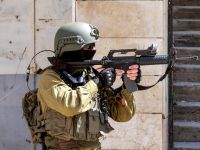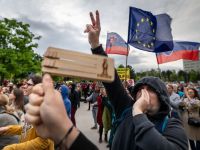United States Assistant Secretary of State for the Near East William Burns is paying a surprise visit to the Saudi Kingdom in order to discuss the details of Crown Prince Abdullah's peace proposal. The plan aims to restart Middle East peace talks and end Israeli-Palestinian violence.
On Thursday, the U.S. State Department announced that during his visit, Burns asked for additional details on the plan after meeting last week in Washington with Abdullah's assistant on foreign affairs.
Dispatching Burns to Saudi Arabia is an another indication of the Bush administration's increased interest in the Saudi plan.
Meanwhile, Egypt’s president Hosni Mubarak was the first Arab leader to express doubts that the Saudi plan would eventually work. In an interview published Thursday by the Washington Times Mubarak asked, "are the Israelis ready to withdraw from the occupied territories?" where they have been since the 1967 Middle East war.
"They have started to say, 'let's talk to Crown Prince Abdullah. We want to discuss and make negotiations, meet halfway.' This will not work," said Mubarak.
Mubarak also ridiculed at the description of Crown Prince Abdullah's proposal as new, noting that "in 1996, the Arab League was convening in Cairo (and) we concluded a resolution unanimously agreeing upon peace as the strategy of all Arab countries." "Not a single country was excluded. All of them agreed to that."
In an interview also published Thursday by the Egyptian government daily Al-Akhbar, Mubarak said "it is astonishing that certain people (in Israel) speak of negotiations for reaching a compromise with Saudi Arabia on this point, because things are clear -- total withdrawal against total peace."
Egyptian President Mubarak is heading to Washington on Saturday for a previously planned five-day visit.
For his part, European Union (EU) envoy Javier Solana is scheduled to hold talks with U.S. officials next week on the Saudi plan, his spokeswoman, Christina Gallach, said Thursday.
Solana, currently on a regional tour, reviewed the Saudi land-for-peace proposal Thursday with the leaders of Jordan and Egypt.
Gallach said after Solana's talks with Jordan's King Abdullah that the EU envoy would discuss the "initiative" with U.S. officials in Washington on Monday. She added the 45-minute talks with King Abdullah at the Red Sea resort of Aqaba focused on the Saudi proposal.
"The EU and Jordan expressed their full support of the Saudi plan," Gallach said, adding that the two sides agreed to stay in constant contact to coordinate moves to push forward the proposal.
"It is going to be a hectic period of time in which we would also like to cooperate as much as possible to move the peace process forward," Solana said after meeting Mubarak.
"We are going to have the opportunity... to continue in coordinating our work," Solana said of Mubarak's U.S trip. Solana also said he hoped Israel would lift travel restrictions on Palestinian leader Yasser Arafat and allow him to attend the Arab summit to be held in Beirut later this month.
"I think Mr. Arafat will be able to be in Beirut. That is what I hope," he expressed.
Solana is expected to meet with United Nations Secretary-General Kofi Annan in New York for similar talks on Tuesday.
Solana held talks with Saudi Crown Prince Abdullah in Jeddah on Wednesday on his proposal for a full normalization of Arab relations with Israel in return for a full withdrawal from land occupied in the 1967 War.
Solana conveyed that the Prince expected to win backing for his proposal at an Arab League summit in Beirut due in March. An article published Thursday in the Arab language daily Al-Hayat, stated that according to Egyptian sources, the Saudi plan will be a central issue in the announcement to be made at the Beirut summit.
World leaders have latched on to the Saudi initiative, first raised by Prince Abdullah during an interview in the New York Times last week, as a possible way to end the violence between Israelis and Palestinians that erupted in September 2000.
On Thursday, top Palestinian negotiator Saeb Erakat urged Israel to seize the "historic opportunity" contained in the ideas recently floated by the Saudi Crown Prince for achieving Middle East peace.
Israel "must give a clear response to this offer made by the Arab world, which is of major significance," Erakat told reporters following talks in Cairo with Arab League Secretary General Amr Mussa.
"We tell the Israelis this is a historic opportunity and you must seize it," Erakat said.
"The Israelis must know they have a choice: either they opt for settlement and occupation or they choose peace. They cannot have both," Erakat said.
He also called on the United States to "concentrate on the strategic importance of the Saudi ideas".
Erakat said the offer "put an end to all the ideas or proposals for interim or security solutions".
Hizbullah
Lebanon's Resistance party Hizbullah criticized the Saudi peace initiative, saying armed struggle was the means to end Israeli occupation of Arab land and stressing the right of return of Palestinian refugees.
"We must count on jihad (holy war) which is capable of guaranteeing victory in Palestine, even if it only means in the territories occupied in the 1967 (Arab-Israeli) war," the group said in a statement quoted by AFP. Armed struggle is better "than paying a heavy political price like normalisation with the enemy," the statement said.
"We believe that solving the Palestinian question can only be done by safeguarding the legitimate rights of the Palestinian people, namely the right of Palestinian refugees to return" to their homeland, the statement added. (Albawaba.com)
© 2002 Al Bawaba (www.albawaba.com)







